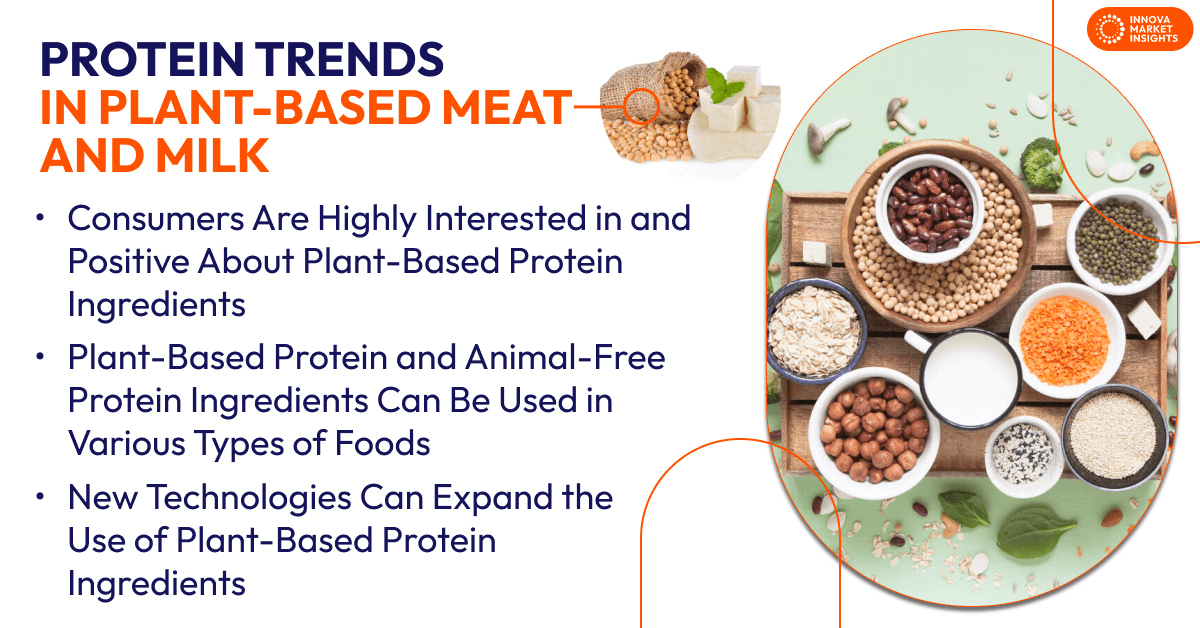March 5, 2024 -The plant-protein market and animal-free protein market is experiencing a lot of innovation related to plant-based protein ingredients, plant-based meat substitutes, plant-based milk products, and other foods and beverages with vegan protein. Numerous food and beverage categories show protein trends, including products with plant-based protein ingredients. These plant-based protein ingredients represent whole food plant-based protein sources such as beans, vegan protein ingredients that are extracted from whole foods like soy and peas, animal-free protein created using precision fermentation, and cell-cultured technology.
Global and Consumer Trends Support Plant-Based Protein
Protein is a major focus for consumers and consumers, and protein trends show growing interest in plant-based protein. Global megatrends and food and beverage market trends support plant-based protein and vegan protein. Major political, economic, sociological, environmental and technological events motivate consumers to pursue health and a sustainable future. Plant-based protein aligns with health and sustainability. Consumer trends show several reasons behind interest in plant-based protein, including health, naturalness, and animal welfare.
A global consumer trend shows that a majority of consumers feel positive about products with plant-based protein, such as plant-based meat and plant-based dairy, saying that they are healthy and natural. Consumer trends also demonstrate interest in plant-based protein as a food ingredient. Consumers say that they are familiar with plant-based dairy alternatives and plant-based meat alternatives. Solid percentages of consumers report having plant-based milk or plant-based meat in the past year.
Plant-Based Protein Is Used in Many Foods and Beverages
Plant-based protein ingredients are added to foods and beverages to provide protein and also to improve sensory features. Protein trends reveal that a lot of innovation in plant-based protein ingredients has taken place over the past few years and more choices of plant-based protein ingredients are available. Launches of foods and beverages with plant-based protein ingredients are going up in Europe and Latin America.
Plant-based protein and animal-free protein trends and ingredients can be found in many food and beverage categories, including ready meals; meat, fish and eggs; plant-based meat substitutes; and plant-based dairy alternatives. Compound annual growth is strongest in plant-based meat substitutes, spreads, plant-based dairy alternatives, and soups.

Protein, Vegan, Vegetarian, and Plant-based Claims Are Common
The most common claims on package labels of products with plant-based protein trends pertain to protein, vegan, vegetarian, and plant-based. Halal claims are also going up. Over one-quarter of food and beverage launches with plant-based protein or non-animal protein ingredients have a protein claim, and protein claims are more common on plant-based products than on conventional ones. Following protein claims in prevalence are gluten-free claims. Vegan, vegetarian and plant-based claims, which also may connote clean label, sustainable, and lifestyle choices, are growing well on products with plant-based protein or non-animal protein ingredients.
In plant-based dairy alternatives, vegan claims and plant-based claims are growing. Other fast-growing claims include halal, added calcium, and sugar-free.
Soy, Pea and Wheat Protein Are Widely Used Plant-Based Proteins
Soy protein, pea protein, and wheat protein are the most widely used plant-based protein ingredients. Plant-based protein ingredients from other types of legumes also are emerging. They may be used in intact, isolated, hydrolyzed, or concentrated forms. Over half of launches of plant-based meat substitutes contain plant-based protein or non-animal protein ingredients, up nearly 10 percentage points since 2020. Protein is an important feature of plant-based meat substitutes because consumers are looking for high-protein products that have similar protein and nutrition to animal-based meat and dairy products. Meat substitutes with plant-based protein or non-animal protein ingredients are growing faster than meat substitutes overall.
Plant-Based Meat Substitutes and Dairy Substitutes Lead the Plant-Based Market
Growth in subcategories for plant-based meat substitutes and non-animal meat substitutes is led by soy products, plant-based fish alternatives, and plant-based poultry alternatives. Plant-based burgers, ground meat and meatballs show more modest growth.
Penetration of plant-based proteins and non-animal proteins is growing in dairy alternatives such as dairy alternative drinks, spoonable non-dairy yogurt, non-dairy cheese, and non-dairy ice cream. One challenge with plant-based dairy alternative milks is that oat milk, coconut milk and almond milk do not contain a lot of protein. Manufacturers are beginning to make changes that consider nutrition in plant-based dairy alternative milks and cheeses.
What’s Next? New Technologies and Improved Products
Consumer trends show that consumers are excited about new technologies for creating plant-based meat substitutes and dairy alternatives. Vegetarians and vegans are especially curious and excited about new technologies for plant-based meat substitutes and plant-based dairy alternatives. Manufacturers also can look for opportunities to improve taste and nutrition in products with plant-based protein ingredients.
This article is based on our Insider report, “Global Growing Use of Plant Protein Ingredients.” If you are interested in reading our report on plant-based dairy and plant-based meat in the US and Canada, feel free to request a demo. You can do this by either booking a demo or using our Contact Form.